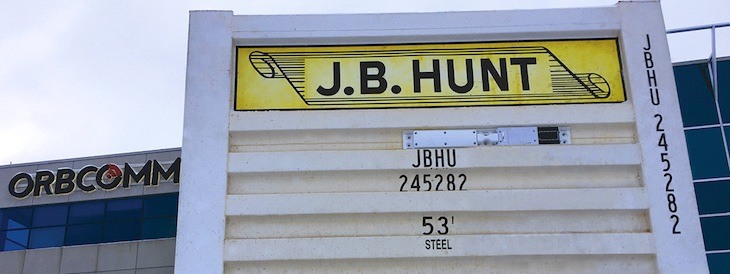J.B. Hunt delays release of 2018 financial expectations to ‘dig a little deeper’
by November 8, 2017 7:32 pm 1,099 views

By this time last year, J.B. Hunt Transport Services had released its financial expectations for the upcoming year, but John Roberts, president and CEO of the Lowell-based carrier, said the company has changed its planning cycle.
“That work is still underway,” Roberts said. “That gives us a chance to finish the year and dig a little deeper.”
Roberts made a brief presentation on J.B. Hunt, and he and Chief Financial Officer David Mee answered questions in a live webcast at the Baird 2017 Global Industrial Conference in Chicago on Wednesday (Nov. 8). In Roberts’ presentation, “Goals & Big Rocks for 2018 and Beyond,” he said the carrier has kept “cadence between our earnings and earnings per share. That’s something that we’re very focused on going forward.” The carrier looks to increase earnings per share at pace with revenue or at a faster rate than revenue growth.
On Oct. 13, the carrier reported third-quarter earnings fell 8% to $100.385 million, or 91 cents per share, and revenue increased 9% to $1.843 billion.
Roberts also discussed the carrier’s $500 million investment into technology over the next five years, and the addition of Marketplace, a component of J.B. Hunt 360, to better match carriers with shippers. The company is in the first phase of the four phase process and has spent about 20% of the investment.
The phased in approach allows the company to understand what customers want and what the company needs, he said. Early indicators show “Marketplace business is happening and growing.” As part of the J.B. Hunt 360 transportation management system, it links together certain aspects of the business and is expected to offer services at a lower price point. At the same time, the service is expected boost revenue; however, the carrier won’t know how it will impact revenue until the later stages of testing.
The $500 million investment is split into three categories: $136 million to enhance its operating system, $141 million to improve its infrastructure and $223 million to create innovative and disruptive technology. The previous two are more backend investments, which can’t be seen, while the latter are more customer related. Roberts said the company expected “some heavy lifting this year on the technology front. So far all the reads we have on the pilot and the connectivity and the data that’s being presented by this work is encouraging for us.”
This year, the carrier installed tracking devices in its intermodal containers, providing customers “better costing and better planning,” Roberts said. It will also allow the company to increase their use, especially in the East where more pressure on trucking is expected. And, the carrier installed the devices in its trailers, allowing for better visibility of existing capacity and improved customer service.

Also, Shelley Simpson, was promoted to chief commercial officer and president of highway services, which was established to bring together two of the carrier’s business segments: truckload and brokerage.
In its brokerage segment, the company has increased the amount of spot market freight it handles, compared to contract freight. However, the company doesn’t want to put too much exposure on it and move too far away from what customers expect. In October, dry-van spot market rates increased 22%, from the same month in 2016, according to DAT Solutions.
“Brokerage feels much more appropriate in the spot market,” Roberts said.
In August, the company purchased e-commerce carrier Special Logistics Dedicated for $136 million. With the purchase of the Houston-based carrier, J.B. Hunt acquired 14 terminals and fulfillment centers and a fleet of more than 850 pieces of equipment.
“We think e-commerce is very real and here to stay,” Roberts said.
It was the first acquisition in 26 years for J.B. Hunt, but the carrier isn’t unfamiliar with deals such as this.
“Acquisitions are pitched to us constantly,” Mee said.
But the acquisition of Special Logistics Dedicated was “very easy” and “natural to us.” He’s uncertain whether J.B. Hunt would consider a deal with an intermodal or truckload carrier, but if it could find a deal to leverage quickly and was a good culture fit, it would be considered.
Mee said the company viewed the purchase as if it were a “private fleet conversion.” He explained companies have looked to J.B. Hunt “to get out of private fleets.” Companies have wanted to shed their fleets because of driver recruiting and driver wages issues, an accident in which they had to pay a claim or they need to upgrade their fleets. Two weeks ago, a customer came to J.B. Hunt because they didn’t want to deal with ELDs, he said.
Shares of J.B. Hunt (NASDAQ: JBHT) closed Wednesday at $104.36, down $2.29 or 2.15%. In the past 52 weeks, the stock has ranged from $111.98 to $83.35.
